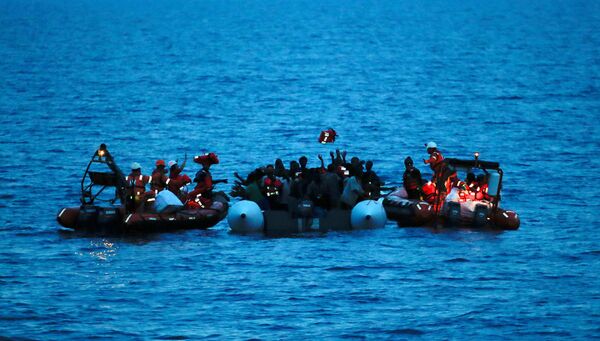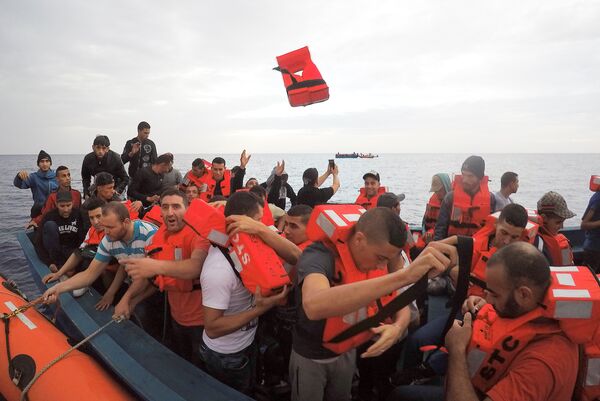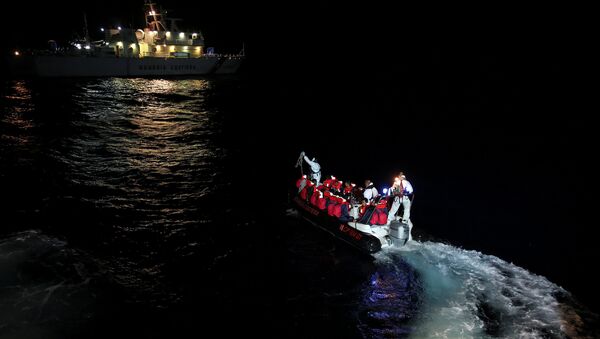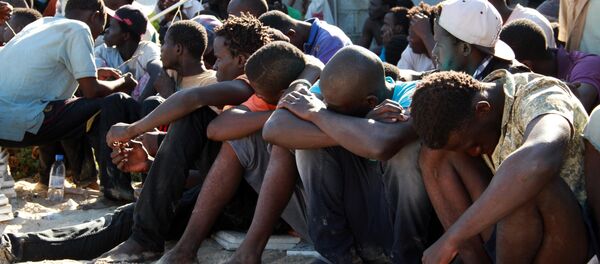Amnesty's report, called "Libya's dark web of collusion," details how EU governments actively support a "system of abuse and exploitation of refugees and migrants" in the North African country. In 2017 alone, about 20,000 people have been detained by Libyan authorities and imprisoned in overcrowded detention camps, where, according to Amnesty, they face "horrific treatment" and "systemic abuse."
Speaking to Radio Sputnik, Dr. Paolo Cuttitta, a professor of law and migration law at Vrije Universiteit Amsterdam, outlined where Brussels' and Rome's complicity lies.
Sputnik: What's your take on Amnesty's findings? Are these accusations legitimate?
Dr. Cuttitta: First of all, let me just say that Libyan authorities have been actively involved in torture and abuses for a long time, and the EU authorities have been aware of it for ages…It's a long story that started a long, long time ago. It is going on. And support from Italy and from the EU in general has increased recently. Authorities in Libya are not only involved in the torture of people being held in prison, but also in smuggling activities as well, so they profit from the organization of sea crossings. This was pointed out by several media reports, as well as reports from the United Nations, last December and this June.
So is the EU complicit in these crimes committed by Libyan authorities and by known state actors such as militias across Libyan territory? Is Italy complicit? Of course they are. As I've said, they know perfectly what's going on in Libya, and they cooperate with them. They know that the Libyan authorities are criminals and they help them to commit more crimes. How do they help? First, by donating vessels, for example, to the Libyan coast guard, so that the latter can stop more migrant boats. Italy has already donated four vessels this year, and has committed itself to donate six more in the near future. [Second, this is done] by offering training to Libyan coast guard officers, which the EU has been doing since October 2016. Italy also sent a military ship to Libya in August, which has been stationed there since then to coordinate operational cooperation for border control and for pushbacks of migrants apprehended at sea.

More generally, the Maritime Coordination Center is prioritizing interventions from the Libyan coast guard rather than from the few remaining NGOS that are still operating for search and rescue in international waters. Many [of these NGOs] have left the Central Mediterranean, because they don't want to be complicit – they don't want to stay there and assist these illegal pushbacks, coordinated by the Italian coastguard, and carried out by Libyan authorities…
So on the one hand there is a problem with the principle of…pushing back people, prohibited by international law, and the second issue is that Italy and the EU may be considered complicit, based on the principles contained in the articles drafted by the International Law Commission of the United Nations regarding the responsibility of states for internationally wrongful acts. These principles state that if a state aids another state to commit a crime, being aware of the crime, they are also accountable. This is exactly the case for anything happening in Libya, from the sea to the detention centers; because Italy and the EU are supporting Libyan authorities to take people back to Libya and to keep committing crimes against them. This is the situation. Whether this can lead to court judgements is difficult to tell.

Sputnik: EU Council President Donald Tusk has suggested scrapping migrant quotas. What do you think about the likelihood of this scenario?
Dr. Cuttitta: [Quotas] are unlikely to be respected, as we saw last, because Poland, Hungary and the Czech Republic don't want to accept quotas. The EU had to refer [these] three member states to the Court of Justice. So there's no consensus on quotas for refugees. Even the recent proposal to revise the regulation imposing the burden of carrying out asylum procedures to the country of first entry (meaning Italy, Greece and the other countries of arrival)…will almost surely fail to be approved because of the opposition of countries such as Poland, Hungary and the Czech Republic.


